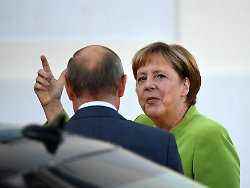It was “economically cheaper”
Merkel explains how Nord Stream 2 came about
06/18/2022, 00:55 am
After the Minsk Agreement negotiations, then-Chancellor Merkel considered the pipeline acceptable. She explains the pros and cons of Nord Stream 2 and recaps the events leading up to the Russian attack on Ukraine. With the conclusion that gas was “not a weapon” in this respect.
Former Chancellor Angela Merkel has defended the controversial decision to build the Nord Stream 2 Baltic Sea pipeline despite the Russian annexation of Crimea, citing consideration for the German economy as one of the reasons. “I didn’t believe in change through trade, but in connection through trade, with the second largest nuclear power in the world,” said CDU member Merkel to the editorial network Germany according to the advance notice. Against this background, she considered the pipeline to be justifiable after the negotiations on the Minsk peace agreement for eastern Ukraine.
But it wasn’t an easy decision. “The thesis at the time was that once Nord Stream 2 is operational, Putin will stop supplying gas through Ukraine or even attack it.” The West ensured that gas was still delivered through Ukraine and that it continued to receive transit fees. Putin then attacked Ukraine on February 24, even though not a single cubic meter of gas had flowed through Nord Stream 2. “In this sense, gas was not a weapon,” Merkel said.
She referred to the already high energy prices at that time due to the promotion of renewable energies, the nuclear phase-out and the beginning of the phase-out of coal. “At the time, the German economy opted for pipeline gas transport from Russia because it was economically cheaper than liquid gas from Saudi Arabia, Qatar and the United Arab Emirates and later also from the USA.” Politically, it was a question of whether, instead of Russian gas, the significantly more expensive and ecologically controversial liquid gas would be bought “against the wishes of the economy, against Germany’s industrial strength”.
Merkel emphasized “We were ready to support the construction of two LNG terminals in Germany with taxpayers’ money. However, up to the last day of my term in office, no company built an LNG terminal in Germany because there was no importer who would do so because of the high price in the country would have booked long-term capacities in advance.”
